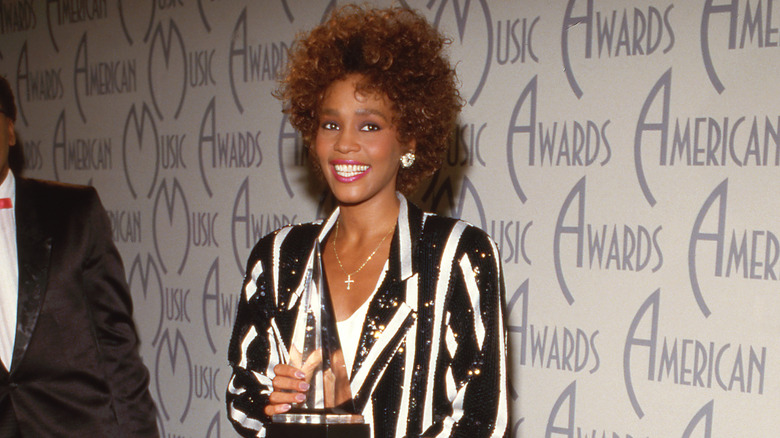Why Whitney Houston's Brother Felt He Played A Role In Her Tragic Death
The following article contains mention of drug use.
Since Whitney Houston's tragic death in 2012, there's been a lot of talk over who was responsible for her passing. However, speaking to Oprah Winfrey back in 2013, her older brother, Michael Houston, shared that he believed much of the blame was on him.
Per OWN, throughout her life, Whitney had a strong relationship with Michael and their half-brother, Gary Houston. However, that was especially true of her relationship with Michael. In fact, speaking to Winfrey, he shared that they'd done almost everything together as kids (via Cali Fornia). Unfortunately, that had been the case as they got older, too — and Whitney ended up following in his footsteps as he went down a dangerous path.
In the years since his sister's passing, Michael hasn't made many public statements. However, on the few occasions that he has, he's opened up about how heartbroken he was to have lost his sister. In a 2018 interview, the man behind the "Whitney" documentary, Kevin Macdonald told Vanity Fair that Michael had said being interviewed for the film felt like a form of trauma counseling. It was well-needed, too. As Michael mentioned in his interview with Winfrey, when he lost Whitney, he felt like he lost a major part of himself. The blow was undoubtedly more devastating, though, because of the role he believed he played in her passing. As Michael shared in his first interview, it was he who first introduced the late singer to recreational drug use.
Michael blamed himself for Whitney's drug use
Speaking to Oprah Winfrey, Michael Houston shared that he believed his own drug use is what led his sister to begin using herself. As he explained, they'd been attached at the hip all their lives, with Whitney Houston following his example. "We did everything together, so once I was in that, she followed suit," he admitted, with a pained expression.
As for whether he had been present the first time Whitney used freebasing and crack cocaine, Michael appeared unsure at first, before acknowledging that he probably had been. Either way, he had no doubts that he was responsible for influencing her to try it, and they went on to use drugs together. Knowing that he'd played a role is something that has continued to haunt him. That was despite Whitney, herself, repeatedly telling him that she was responsible for her choices before her death.
As for Michael and Whitney's mother, Cissy Houston, while she appeared tearful as Michael made his admissions to Winfrey, speaking to "The View" soon after the interview aired, she seemed to have made peace. In fact, she made sure to point out that she loved Michael, Whitney and her other son, Gary Houston, no matter what. Asked how she'd felt, hearing Michael's revelation, she quipped, "Crazy ... about to knock him out. But you know, there's nothing I can do about that. I raised three wonderful kids" (via RestlessRick).
Michael also said circumstances made things worse
While Michael Houston took responsibility for negatively influencing his famous younger sister, he also explained to Oprah Winfrey that a number of factors had played a role in exacerbating the tragic situation.
For starters, he said, when Whitney Houston first began using crack and freebasing cocaine in the '80s, there was a relative nonchalance about it. As he pointed out, people weren't aware of the consequences, and it had become widely available in the entertainment business. Michael also explained that at the time he and Whitney used together, she was fairly newly famous, they were touring, and got swept away in the lifestyle.
Whitney's loved ones have long said that her experience with fame played a major role in her addiction. As an insider close to the family told People, there was a lot of pressure on her to seem perfect. "There has to be some outlet. For her, it became drugs," the source said. That certainly may be the case — and even without Michael's influence, there's a chance she may have been impacted by the environment she was in at the time. However, as Michael told Winfrey, he's never been able to shake his feeling of responsibility, and at the time of the interview, he didn't believe he ever would.
If you or anyone you know needs help with addiction issues, help is available. Visit the Substance Abuse and Mental Health Services Administration website or contact SAMHSA's National Helpline at 1-800-662-HELP (4357).



